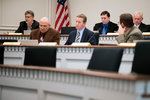

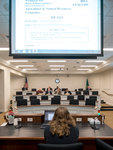
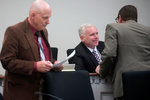
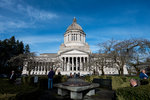
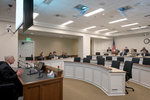
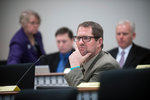
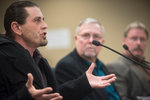
A proposed bill to prohibit fireworks and recreational fires next summer did not get a warm reception from fireworks businesses in an Agriculture & Natural Resources Committee hearing Thursday in Olympia.
House Bill 2310, sponsored by Kevin Van De Wege, D-Sequim, calls for the sale, purchase and use of consumer fireworks to be prohibited from June 1 to Sept. 30 of this year.
It also would require people to get permits to burn outdoors July 1 through Sept. 30, but not allow agencies to permit outdoor burning “unless the burning is necessary to protect life or property, or necessary for the public health, safety or welfare.”
Van De Wege joked that people may want to call him “Representative Fun Killer” due to the bill.
But with the wildfire destruction and cost in the last two years, which amounts to about $250 million, he said he feels something substantial needs to be done, but he is open to amending and paring down the bill however the committee sees fit.
The act would expire on Oct. 1. Van De Wege said he hopes that similar legislation would be considered yearly depending on the modeling and forecasts.
The majority of public testimony heard by the committee came from fireworks businesses or from organizations who sell fireworks as a regular fundraiser.
Katie Westall, with Thunder Fireworks in Tacoma, said retailers begin preparing months in advance for the Fourth of July each year, ordering products and getting permits, leases and insurance.
“We already have our product now. If this ban goes into effect, retailers would be out of anywhere from $10,000 to $150,000,” Westall said. “... An entire industry would fall into debt.”
The bill, if passed, could also impact non-profit groups that regularly sell fireworks as fundraisers.
Clint Cole, with Thurston County Search and Rescue, said the organization has signed contracts through both 2016 and 2017.
“In 2016 if we weren’t able to sell fireworks you would put Thurston County Search and Rescue out of business,” Cole said.
To do that would cost lives, he said. The nonprofit organization has helped with rescue efforts at Mount St. Helens, on the Chehalis River and other events.
Jon Salzman, with Edgewood Fireworks Inc. in Bellevue and the Northwest Pyrotechnics Association, said the bill is just a “bandaid” fix and hurts the fireworks industry in Washington.
At the same time as the hearing on HB2310, there was a hearing on House Bill 2348 to give local governments the ability to prohibit or restrict fireworks beyond the state’s laws.
Current code states that if cities or counties approve more restrictive fireworks ordinances than the state, the local rules don’t go into effect until one year after adoption. HB2348 would eliminate the one-year wait time.
Forty lawmakers have signed on to sponsor HB2348, including Van De Wege and Rep. Brian Blake, D-Aberdeen.
This summer’s drought sparked a conversation about banning or further restricting fireworks in cities and unincorporated Lewis County.
This fall, the city of Winlock approved increased fireworks restrictions limiting discharge dates to July 2, 3 and 4 and Dec. 31 until 1 a.m. on Jan. 1.
Due to the one-year wait time, Winlock’s increased restrictions won’t be in effect for this summer’s Fourth of July. The town will follow the state’s rules.
The changes would be effective for New Year’s Eve 2016.
Centralia City Councilor Max Vogt in October proposed the city consider increased restrictions when it comes to fireworks.
Currently, the city operates under the state’s law, which allows fireworks only be sold from June 28 to July 5, and Dec. 28 to Dec. 31 and discharged June 28 to July 5, New Year’s Eve and from midnight to 1 a.m. New Year’s Day.
Lewis County commissioners and some local fire chiefs urged residents to forgo personal fireworks on the Fourth of July this year. The county commissioners imposed a burn ban prior to July 4 this summer.
While public testimony focused on fireworks at Thursday’s hearing, Van De Wege said Department of Natural Resources and counties putting burn bans in place at different times caused confusion for people, and the bill would help with that.
Representatives from DNR and the Washington State Department of Fish and Wildlife also spoke on the bill, and while they appreciated the bill’s intent, they had specific points they wanted to see addressed.
Bob Johnson, wildfire division manager for DNR, said he is uncertain how exactly the bill would affect DNR.
The outdoor burning restriction as written could shut down fire training and prescribed burning for forest health, he said.
Ensuring compliance with the bill would require more DNR resources than the agency currently has available or in its budget proposal.
Madeline Goodwin, an environmental studies graduate student at The Evergreen State College in Olympia, spoke in support of the outdoor burning ban portion of the bill.
“Not only do we not have perhaps the financial and personnel resources for combatting wildfire, we also may just not have the water to fight these fires,” Goodwin said.
She said while she enjoys campfires, accidents happen.
“I would rather roast my marshmallows over a camp stove or … wait until the rains are here than have fun roasting a marshmallow and then, ‘Oh, oops I just lit the forest on fire.’”